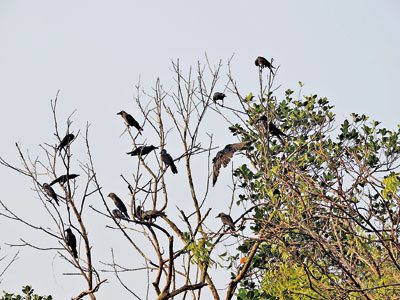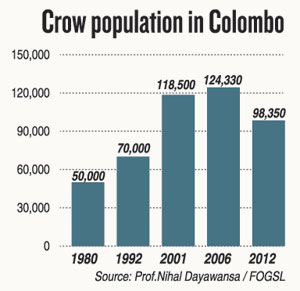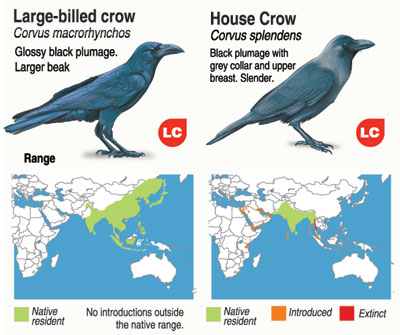News
Opportunist, thieving native kaputa, a menace in other lands
 According to a news report, several Malaysian women had an embarrassing experience when they lost their undergarments that had been left to dry outside. Their initial suspect was a ‘panty thief’, but the stolen items were found in birds’ nests in the area. The ‘panty thief’ was in fact the house crows.
According to a news report, several Malaysian women had an embarrassing experience when they lost their undergarments that had been left to dry outside. Their initial suspect was a ‘panty thief’, but the stolen items were found in birds’ nests in the area. The ‘panty thief’ was in fact the house crows.
Crows have become a nuisance to Malaysians. The birds steal food and their droppings cause other problems.
Malaysia has two native crow species, but the troublemaker is house crow (corvus splendens) introduced to the country about 100 years ago. Malaysian bird experts, told the Sunday Times that these house crows had originated in Sri Lanka.
“The house crow is an introduced species in Peninsular Malaysia and Singapore and based on what we know, the house crow was introduced to this part of the world from individuals who imported them to the state of Selangor in Malaysia from Sri Lanka when both countries were ruled by the British,’’ said Dr. Yong Dingli, regional flyway coordinator of BirdLife International based in Singapore. The crows had apparently been imported to control pests in plantations, Dr. Yong said.
The global invasive species database managed by the IUCN states that the house crow has been established in at least 25 countries as an invasive species. The Invasive Species Compendium (CABI) states that the first introduction was in the 1870s from Sri Lanka to control a plague of caterpillars. The reports indicate 56 house crows were imported from Sri Lanka to Port Klang. According to the book, Birds of the Thai-Malay Peninsula, these birds were captured from somewhere near Mt. Lavinia. 
From a study of the genetic diversity of native and introduced populations in Asia and Africa, researchers found that the lowest genetic diversity was found for the intentionally introduced population in Selangor, Malaysia, proving that Sri Lanka should be the source population for Selangor consistent with a documented introduction over 100 years ago.
The reason for more diverse genetic diversity of crows in other areas of Malaysia could be that crows could also spread through shipping.
“It is also possible that house crows could also arrive in the region through shipping connecting ports,” Dr. Yong said.
The house crow, famously known as ‘kolamba kaputa’ is native to South Asia, but is now found in the Malay peninsula, certain parts of Africa, and even Victoria in Australia.
The kaputa is also a threat to native creatures.
Singapore has successfully managed to keep them at bay.
Although ‘kolamba kaputas’ are not panty thieves, they steal other artificial items to build nests. Clothes hangers are one of their favourite items.
Though not attractive, crows are known for their cunning behaviour and intelligence.
Experiments have shown how a crow drops stones into a water container to lift the water level to drink.
The cafeteria of the University of Colombo was a place from where crows were found to be stealing items.
Prabath Rodrigo, recalled: “I had left my food plate to wash my hands. A crow came from nowhere and stole the egg. Nobody would believe this if they had not seen it.’’ 
Still, kaputas have been shown to be dumb when defending its nest. The koel, or the cuckoo, lays its eggs on a crow’s nest.
Instead of whistling a happy tune, crows cackle and squawk in irritating patterns.
But crows are also known for their brotherhood. They alert other family members when they find food. They also roost communally where crows in one area choose a tree to spend the night.
They often nest with mynas which are also known to roost in groups.
The large tree near the Borella cemetery is one such example.
The Field Ornithology Group of Sri Lanka (FOGSL) has been doing a roosting count of crows of Colombo for the past 40 years. Records that the crow population in Colombo peaked in 2006, but declined in 2012.
Prof. Nihal Dayawansa, the group’s president, said open garbage dumps and irresponsible disposal of food are factors in the population of crows rising.
In 2010, the then government under Mahinda Rajapaksa began a programme to make Colombo beautiful while closing a number of open garbage dumps. Prof. Dayawansa said that this would have resulted in the decline in Colombo’s population of crows.
The best way to say that you found the home of your dreams is by finding it on Hitad.lk. We have listings for apartments for sale or rent in Sri Lanka, no matter what locale you're looking for! Whether you live in Colombo, Galle, Kandy, Matara, Jaffna and more - we've got them all!

